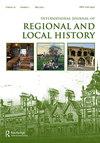19世纪和20世纪英国粗犷音乐和焚烧人像的衰落以及11月5日的转变
Q2 Arts and Humanities
International Journal of Regional and Local History
Pub Date : 2021-07-03
DOI:10.1080/20514530.2021.1988634
引用次数: 0
摘要
摘要19世纪中期,英国仍普遍存在焚烧不受欢迎邻居肖像的行为,这是与粗糙音乐相关的最重要的行为之一,包括在11月5日,即盖伊·福克斯之夜。但一旦第五王朝被新的赞助人所改造,焚烧肖像的做法就成为了批评和监管的对象,并在1900年后普遍减少。它在新闻界和地方法院受到了源源不断的批评,到20世纪被视为文化时代错误。与此同时,一直是娱乐日的11月5日,在1918年后越来越受到商业主义的欢迎。本文章由计算机程序翻译,如有差异,请以英文原文为准。
Aspects of the Decline of English Rough Music and Effigy-burning and the Transformation of the Fifth of November in the Nineteenth and Twentieth Centuries
ABSTRACT One of the most important practices associated with rough music, the effigy-burning of unpopular neighbours, was still practiced widely in mid-nineteenth century England, including on the Fifth of November, or Guy Fawkes Night. But once the Fifth became transformed by new patronage, the practice of effigy-burning became the object of criticism and policing and generally declined after 1900. It had undergone a steady stream of criticism in the press and in the magistrates’ courts and was by the twentieth century regarded as a cultural anachronism. Meanwhile the Fifth of November, which had always been a day of entertainment, was increasingly embraced by commercialism after 1918.
求助全文
通过发布文献求助,成功后即可免费获取论文全文。
去求助
来源期刊

International Journal of Regional and Local History
Arts and Humanities-History
CiteScore
0.30
自引率
0.00%
发文量
10
期刊介绍:
The International Journal of Regional and Local History aims to publish high-quality academic articles which address the history of regions and localities in the medieval, early-modern and modern eras. Regional and local are defined in broad terms, encouraging their examination in both urban and rural contexts, and as administrative, cultural and geographical entities. Regional histories may transcend both local and national boundaries, and offer a means of interrogating the temporality of such structures. Such histories might broaden understandings arrived at through a national focus or help develop agendas for future exploration. The subject matter of regional and local histories invites a number of methodological approaches including oral history, comparative history, cultural history and history from below. We welcome contributions situated in these methodological frameworks but are also keen to elicit inter-disciplinary work which seeks to understand the history of regions or localities through the methodologies of geography, sociology or cultural studies. The journal also publishes book reviews and review articles on themes relating to regional or local history.
 求助内容:
求助内容: 应助结果提醒方式:
应助结果提醒方式:


